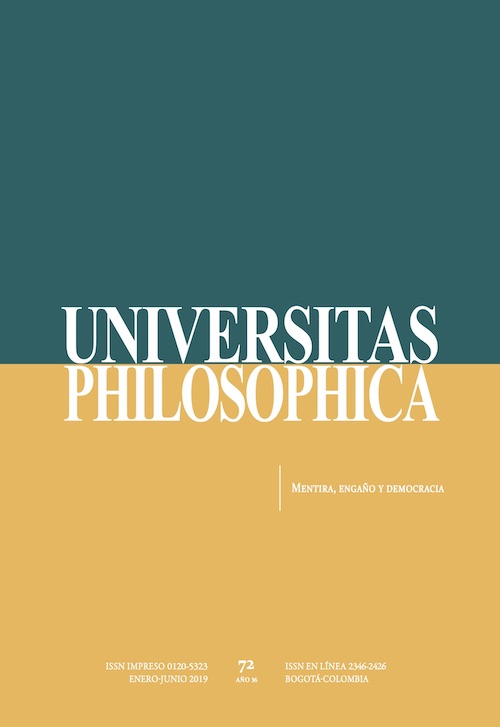Resumen
La mentira no es nada nuevo en la existencia humana, ni en la filosofía ni en la ciencia política, pero solo el análisis fenomenológico de Arendt revela con particular énfasis la tensión permanente entre verdad y mentira en el espacio político, y la debilidad estructural de la verdad frente a la mentira. Esta perspectiva arendtiana ayuda a comprender la tentación del nuevo fenómeno de la llamada posverdad, que se manifiesta en las fake news (noticias falsas), las teorías conspirativas y la propaganda populista. El presente artículo trata de explicar las condiciones políticas y sociales del nacimiento de esta posverdad, las diferencias respecto a la mentira política, que Arendt enfrentó en Estados Unidos en los años sesenta del siglo XX, y ofrece una reflexión sobre el concepto arendtiano de una pluralidad cualitativa como medida contra la a-mundialidad de la posverdad.
Alterman, E. (2004). When Presidents Lie: A History of Official Deception and Its Consequences. New York: Penguin Books.
Arendt, H. (1974). La condición humana. Barcelona: Seix Barral.
Arendt, H. (1996). Verdad y política. En: Entre pasado y futuro. Ocho ejercicios sobre la reflexión política (pp. 347-402). Barcelona: Península.
Arendt, H. (1999). Arendt sobre Arendt. Un debate sobre su pensamiento. En: De la historia a la acción (pp. 139-171). Barcelona: Paidós.
Arendt, H. (2017). Wie ich einmal ohne Dich leben soll, mag ich mir nicht vorstellen. Briefwechsel mit den Freundinnen Charlotte Beradt, Rose Feitelson, Hilde Fränkel, Anne Weil und Helen Wolff. I. Nordmann y U. Ludz (Eds.). München: Piper.
Bauman, Z. (2017). Retrotopia. Berlin: Suhrkamp.
Bettetini, M. (2003). Eine kleine Geschichte der Lüge. Von Odysseus bis Pinocchio. Berlin: Wagenbach Verlag.
Butter, M. (2018). „Nichts ist, wie es scheint“: Über Verschwörungstheorien. Berlin: Suhrkamp.
Colliot-Thélène, C. (2011). La démocratie sans « démos ». Paris: PUF.
Crouch, C. (2004). La posdemocracia. Madrid: Taurus.
Dietz, S. (2003). Die Kunst des Lügens. Eine sprachliche Fähigkeit und ihr moralischer Wert. Reinbek: Rowohlt.
Edelman (2017). Edelman Trust Barometer [base de datos y recursos]. Recuperado de: https://www.edelman.com/trust-barometer.
Feuerbach, L. (2017, octubre 30). Das Muster der Verschwörung. Frankfurter Allgemeine. Recuperado de: https://www.faz.net/aktuell/gesellschaft/menschen/chemtrails-reptiloide-eine-ex-verschwoerungstheoretikerin-berichtet-15267921.html
Ganzfried, D. (2002). …alias Wilkomirski. Die Holocaust-Travestie. Enthüllung und Dokumentation eines literarischen Skandals. Berlin: Jüdische Verlagsanstalt.
Gutjahr, R. (2018, enero 17). „An Deiner Stelle würd ich mir in Die Hose scheissen, das meiner Tochter auch mal was passieren könnte.“ Zeit Online. Recuperado de: https://www.zeit.de/2018/04/soziale-medien-richard-gutjahr-bedrohung-netzdg-internet.
Heuer, W. (2016) Föderationen. Hannah Arendts politische Grammatik des Gründens, Glückstadt: J. J. Augustin.
Illouz, E. (2007). Intimidades congeladas. Las emociones en el capitalismo. (Trad. J. Ibarburu). Buenos Aires: Kats.
Illouz, E. (2017, enero 30). Gefühle sind nicht das Problem. Entrevista de J. Encke. Frankfurter Allgemeine. Recuperado de: https://www.faz.net/aktuell/feuilleton/debatten/soziologin-eva-illouz-spricht-im-interview-ueber-donald-trump-14772303.html
Kant, I. (1986 [1797]). Sobre un presunto derecho de mentir por filantropía. En: Teoría y práctica (pp. 61-68). (Estudio preliminar R. Rodríguez Aramayo; Trad. J. M. Palacios, M. F. López Pérez y R. Rodríguez Aramayo). Madrid: Tecnos.
Keane, J. (2018, enero). Reflections on Post-Truth. Conferencia pronunciada en el marco de la serie „Achtung: Demokratie“ del Wissenschaftzentrum Berlin für Sozialforschung (WZB), Berlín, Alemania. Recuperado de: https://www.wzb.eu/en/node/56426#.
Keane, J. (2016). Los nuevos despotismos: imaginando el fin de la democracia. Recerca, Revista de Pensament i Anàlisi, 19, 137-154.
Kreide, R. (2016, octubre 4). The Silence of Political Liberalism. Eurozine. Recuperado de: http://www.eurozine.com/the-silence-of-political-liberalism
Machowecz, M. (2017, septiembre 29). Oh, Ostmann! Zeit Online. Recuperado de: https://www.zeit.de/politik/deutschland/2017-09/ostdeutschland-maenner-wut-frauen-ddr
Nanz, P., & Leggewie, C. (2016). Die Konsultative. Mehr Demokratie durch Bürgerbeteiligung. Berlin: Wagenbach.
Nietzsche, F. (2012). Sobre verdad y mentira en sentido extramoral. En: Sobre verdad y mentira en sentido extramoral y otros fragmentos de filosofía del conocimiento (pp. 21-37). M. Garrido (Ed.) Madrid: Tecnos.
van Reybrouck, D. (2017). Contra las elecciones: Cómo salvar la democracia. Barcelona: Taurus.
Stangl, W. (2018). Mentiologie. En: Online Lexikon für Psychologie und Pädagogik (2018-01-17). Recuperado de: http://lexikon.stangl.eu/6008/mentiologie/.
Strauss, L. (1959). What is Political Philosophy? And other Studies. Chicago: The University of Chicago Press.
Esta revista científica se encuentra registrada bajo la licencia Creative Commons Reconocimiento 4.0 Internacional. Por lo tanto, esta obra se puede reproducir, distribuir y comunicar públicamente en formato digital, siempre que se reconozca el nombre de los autores y a la Pontificia Universidad Javeriana. Se permite citar, adaptar, transformar, autoarchivar, republicar y crear a partir del material, para cualquier finalidad (incluso comercial), siempre que se reconozca adecuadamente la autoría, se proporcione un enlace a la obra original y se indique si se han realizado cambios. La Pontificia Universidad Javeriana no retiene los derechos sobre las obras publicadas y los contenidos son responsabilidad exclusiva de los autores, quienes conservan sus derechos morales, intelectuales, de privacidad y publicidad.
El aval sobre la intervención de la obra (revisión, corrección de estilo, traducción, diagramación) y su posterior divulgación se otorga mediante una licencia de uso y no a través de una cesión de derechos, lo que representa que la revista y la Pontificia Universidad Javeriana se eximen de cualquier responsabilidad que se pueda derivar de una mala práctica ética por parte de los autores. En consecuencia de la protección brindada por la licencia de uso, la revista no se encuentra en la obligación de publicar retractaciones o modificar la información ya publicada, a no ser que la errata surja del proceso de gestión editorial. La publicación de contenidos en esta revista no representa regalías para los contribuyentes.


